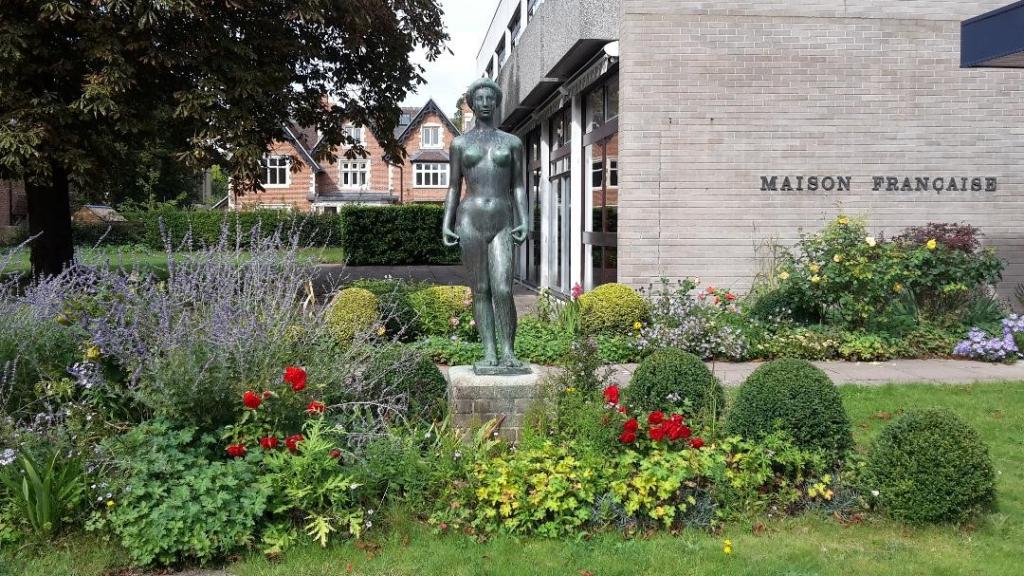
The Maison Française is a French academic centre in Oxford. It shows the will of the French academic world to contribute to and associate itself with the University of Oxford. It opens a window on France for the Faculty of Medieval and Modern Languages but also to the whole of the University.
The Maison was founded just after the Second World War as a testimony to the help received by French scholars from British universities and a way to maintain links with French universities and encourage Franco-British academic collaboration. The project was initiated by the University of Paris, which was soon joined by the French Ministry of Foreign Affairs so that it could play a role in French scientific diplomacy. Since 1999, the present building, officially opened by André Malraux in 1967, has hosted a CNRS research unit which acts as a link between Oxford and all French research centres and universities. 26 similar institutions exist in the whole world, with 3 in Europe: the Maison is the only one in the United Kingdom.
40 to 50 events are hosted or organised by the Maison each academic term. These events, conferences, seminars, exhibitions or even cinema evenings, are convened by researchers in the Maison or by their colleagues in the Faculties. The Maison is a pleasant and comfortable location for events on French studies or for collaboration with French academics and it is where the Sub-Faculty of French holds its regular seminars.
Many French researchers or students visit Oxford for research or to give lectures. They come here to meet colleagues, see rare manuscripts and take part in seminars. The Maison can be of great help to them with its administration, its facilities or even sometimes its accommodation: 11 rooms are available for hosting students who come from the many French partner institutions (Ecole Normale Supérieure, EPHE, EHESS, SciencesPo…) or who hold prestigious scholarships like that of the Chancellerie des Universités de Paris. There are even MFO-French Embassy grants for students wishing to come to Oxford for one month, in all disciplines.
The MFO-St Catherine’s College Visiting Fellowship in Modern and Medieval Languages was started in 2017. In Michaelmas each year, the Visiting Fellows lecture in the Faculty, are housed at the Maison Française d’Oxford and are Research Associates at the College. Laurence Campa (Université Paris 10-Nanterre), a specialist in twentieth-century French poetry, and Michel Magnien (Université Sorbonne Nouvelle-Paris 3), who focuses on the French Renaissance, inaugurated the fellowship. In MT 2018, we were happy to welcome Tumba Shango-Lokoho and Xavier Garnier, both from Université Sorbonne Nouvelle-Paris 3.
Similar Visiting Fellowships are being set up in the History of Science, in Science and in Medicine.
The Maison Française as a Research Unit
The Maison, in its role as a CNRS research unit, hosts French academics (CNRS researchers or university professors) who are on leave from their French position and come to Oxford for 2 or 3 years. Each of them leads one of the major research streams in the Maison: they coordinate collaborations with Oxford academics and organise lectures and seminars with the doctoral students and Associate Members of the Maison.
The Sub-Faculty of French is of course one of the main partners of the Maison. The regular seminars in Medieval French, in Early Modern and in Modern French take place at the Maison in Norham Road. We jointly invite French authors and writers for lectures in the
Taylorian or at the Maison. In 2017, a new series of seminars on Photobooks was introduced at the crossroads between the History of Art and Literature.
Byzantine History, up to the Middle-Ages, is a discipline rooted in the French seventeenth century. It is also a major discipline in Oxford, with a Master’s course in Late Antique and Byzantine Studies. Although Byzantine Studies is part of Classics in Oxford, in France it is generally considered part of Medieval History. The trans-secular sector was developed in the Maison via collaborations with the Ecole Française de Rome and the Casa de Velázquez.
The well-established position of Oxford in the History of Science has just been confirmed by the opening of the new Centre for the History of Science, Medicine and Technology. The Oxford Seminars in the History of Alchemy and Chemistry take place each year in the Maison. A Committee was created more than 15 years ago for the History of Science at the Maison Française, with members from the University of Oxford, Oxford Brookes, and researchers from the MFO. The MFO thus tries to play a special role by combining partners and approaches, Literature and History of Natural Sciences, History of Social Sciences and Humanities.
Between France and Britain, the MFO is in a special position for International Relations, for Politics and European Comparative Law. It partners with the Centre for European Studies, with the DPIR and the Institute of European and Comparative Law to run post-doctoral grants and exchange programmes for researchers and students, as for example in OxPo with SciencesPo Paris.
The Maison widened its scope more recently to include natural and exact sciences: it is important for the University to engage with France in all of its four divisions. French scientists are thus also now hosted in the Maison for long term stays in Oxford, with funding from the relevant departments of the CNRS or from Oxford. Part of their mission is to organise interdisciplinary conferences and workshops, bringing together Physics, Chemistry or Medical sciences with the Humanities, as for example on Epigenetics or Nuclear Energy.
Changing and reinstating the place of the Maison Française in Oxford for a strengthened relationship with France
Brexit is a threat for the whole academic community. The Maison Française can play a particular part in future links between Oxford and continental Europe. It can take advantage of its 70 years of experience in creating and supporting international collaborations. The Maison has always been a French Institution associated with the University of Oxford. The University, the CNRS and the French Ministry want to change it into a real international institution, by re-establishing the Maison with a formal tripartite agreement.
Interdisciplinary research is particularly appropriate here: a joint team will gather French and Oxford researchers in a new project on Digital Culture and Society. Integrating disciplines gets its full meaning with Digital Humanities, or more largely through the interaction of new information technologies and studies on humans and society. Digital Humanities were, for a large part, initiated in Oxford. In this field, a new generation of scholars is on the rise in History, History of Science, Literature, Social Sciences or even Law and Medicine, with many potential partners in the CNRS or French universities. This would give the Maison Française a new meaning in the new European context for Oxford.

